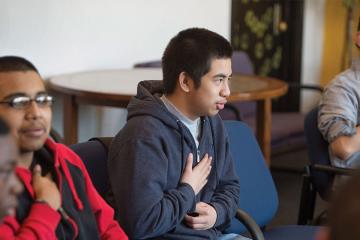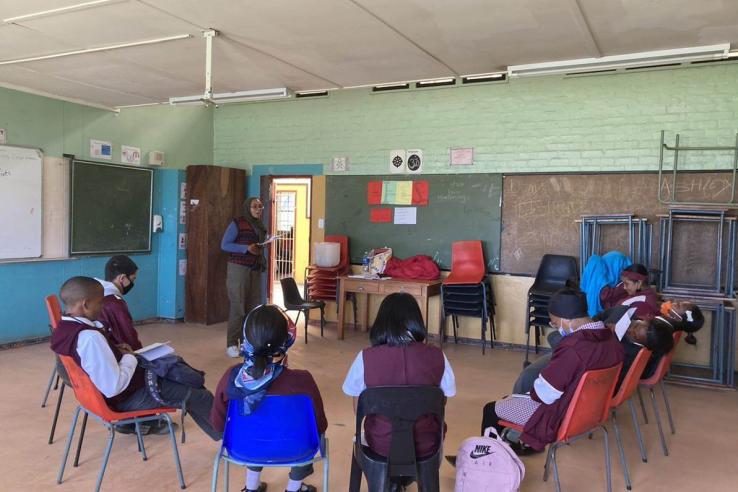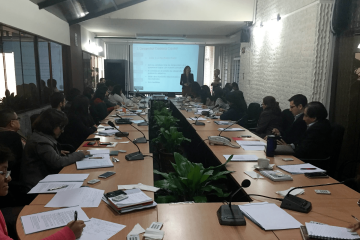
Shukuma in South African schools: Adapting evidence on cognitive behavioural therapy-inspired programmes to reduce violence

This is the first piece in a three-part blog series that will delve deeper into the journey of designing, delivering, and learning from the Shukuma programme implemented in schools in the Western Cape of South Africa.
Blog two will speak to the strength of the partnership between J-PAL and the Western Cape Government in undertaking the pilot programme and the collaborative efforts to design and adapt the programme to a South African context.
In blog three, we will highlight how the programme was implemented and what we learned along the way.
Homicide is the fourth leading cause of death among individuals 10 to 29 years old, with approximately 200,000 instances every year among this group globally.
While evidence-based insights on the most effective ways to reduce crime and violence are scarce, rigorous evidence has shown that one family of interventions may be effective. A strong foundation of evidence suggests that interventions based on the principles of cognitive behavioural therapy (CBT) can help reduce criminal and violent activity, likely by helping individuals focus more on the future, change their self-perceptions, and/or slow their decision-making. CBT-inspired interventions can include a mix of individual counselling, group therapy, and workshops that are typically designed to help participants evaluate and modify the way they think and make decisions, improve their self-image, and relate and adapt to their environments. This approach can help youth to plan ahead and/or slow down automatic reactions in high-stakes situations. Given the strength of the evidence, the Western Cape Government (WCG) and J-PAL Africa implemented a CBT-inspired programme in Western Cape schools, called Shukuma: Moving Mindsets, to reduce learner on learners violence in schools.
Designing the Shukuma programme using rigorous global evidence
Several randomised evaluations have shown that CBT-inspired programmes can have a strong impact on criminal behaviour and academic outcomes. J-PAL affiliated researchers Sara Heller, Jonathan Guryan, Jens Ludwig, and Sendhil Mullainathan along with other coauthors, evaluated a CBT-inspired programme in Chicago and found that rates of readmission to juvenile detention centres decreased by 39 percent for youth within two months of receiving the programme. These results persisted eighteen months later.
In Liberia, J-PAL affiliated researchers Chris Blattman and Julian Jamison along with other coauthors evaluated an intervention with young men at highest risk for criminal or violent behaviour who received access to a CBT-style programme and cash transfers. Results showed that the programme—particularly when combined with a cash transfer—had large and persistent impacts on participants’ criminal and violent behaviour (where participants were 50 percent less likely to engage in aggressive or criminal behaviour in the weeks following the end of the intervention), which continued to be observed ten years after the programme was originally implemented. Receiving therapy also improved some measures of self-control and mental health.
Additionally, CBT has been shown to increase educational outcomes, such as school attendance and learning outcomes, when delivered in schools. Administering the CBT-inspired curriculum, “Becoming a Man (BAM),” to male youth in low-income public schools in Chicago reduced student arrests by 12 percent by the end of the programme. Recipients were also 9 percent more likely to graduate high school on time. The evidence from studying the BAM programme, as a school based, CBT-inforned programme, laid the foundation for Shukuma in the Western Cape.
South Africa: A pertinent location for a CBT-inspired intervention
In South Africa, the need for violence prevention interventions is undeniable. A 2016 study on children in South Africa estimated that 35 percent of youth 15 to 17 years old have experienced sexual and or physical abuse. A large portion of violent encounters among youth occur at school; the 2012 National School Violence Survey found that 22.2 percent of secondary school children have experienced threats of violence, assault, robbery, or sexual assault while at school. Moreover, the 2018/2019 SAPS Annual Crime Report found that 29 percent of contact crime perpetrated by children between the ages of 10 and 17, occurs in the Western Cape Province; contact crime refers to crimes against a person.
Working with the Western Cape Government to design a CBT-inspired programme
With high rates of crime in the Western Cape, local government actors were interested in implementing a school-based behavioural programme to reduce learner-on-learner violence, improve attendance and learning outcomes for high school learners. The WCG chose to deliver the programme in schools, which are considered to be spaces where the government has a strong and legitimate presence, unlike in households or communities where state authorities are not always trusted or able to intervene.
The WCG looked for innovative behavioural approaches to respond to high crime rates in the province and a CBT-inspired intervention posed an interesting solution to some of the challenges experienced by youth in the country.
Youth faced with high-stakes decisions are often heavily influenced by peers, consider short-term goals over long-term goals, and struggle to connect their choices with consequences. While evidence has found that a school-based CBT programme may not completely eliminate the risk factors faced by youth in the short run, it does suggest that it could equip them with the skills needed to make better decisions and navigate challenging environments with deeply embedded cultures of violence, without resorting to such behaviours themselves. CBT-based interventions are considered to be highly adaptable to different contexts and presented an exciting lever for change in South African schools.
More about the Shukuma: Moving Mindsets intervention
In 2020, the WCG’s Department of the Premier in collaboration with the Western Cape Education Department, and J-PAL Africa, undertook a two year pilot project to adapt a school-based CBT intervention in a subset of Western Cape schools. The programme, called Shukuma: Moving Mindsets, which in isiXhosa means “to move,” was adapted from evidence-based programming from other countries, including the United States and Liberia. A priority for the government was to assess the programme's ability to respond to the root causes of youth violence and barriers to learning in South Africa.
The pilot activities were managed by ACT-SA—a locally based implementing partner—and involved a multi-week programme to help Grade 8 and 9 learners develop socio-emotional skills and learn tools to slow down their decision-making process. The programme was implemented over three to six months of the school term, in around 10–15 hour-long small group sessions. These sessions were led by young external facilitators, who had recently graduated from high schools in local communities in the Western Cape and were actively looking for jobs.
Shukuma drew on the BAM curriculum and was adapted to the South African context by local curriculum experts. Each session made use of different group-based activities including: helping learners identify their emotions, learning deep breathing mindfulness techniques, developing an applied understanding of the programmes’ values such as empathy and integrity, and practising mediation and conflict resolution techniques. Facilitators were trained in the curriculum and on how to facilitate group therapy type sessions with learners at a week-long training camp and received on-going mentorship from the ACT-SA team.
Participating schools were selected based on key criteria including level of risk of violence, resources available and geographical location. It was the intention of the WCG for the programme to be integrated into the school structure as far as possible, allocating each school with a “champion teacher,” and local facilitators to ensure the programme was being implemented well. By the close of the 2022 school year, 45 selected schools had piloted the programme, reaching around 4049 learners. A combination of enumerator observation data, and teacher, learner and facilitator reflections suggested that the programme was valued by learners, teachers and facilitators in schools.
What lies ahead for the Shukuma programme
CBT-inspired interventions have proven to be effective in reducing criminal behaviour and can improve academic outcomes for learners. Given the promising results from randomised evaluations on CBT-inspired interventions, the WCG and J-PAL Africa, piloted the Shukuma: Moving Mindsets Programme in a subset of schools in the Western Cape. The objective of the programme was to improve learners’ socio-emotional skills and thereby reduce learner-on-learner violence and improve educational outcomes. A key lesson learned from the pilot and process monitoring research was that learners, teachers and facilitators valued the programme in their schools.
Currently, in 2023, the Shukuma programme model is being consolidated in all Grade 8 classes and some Grade 9 classes in 33 schools in the Western Cape. The learnings from Shukuma are important for policymakers who are interested in innovative behavioural approaches to reducing crime and violence, and improving academic outcomes for learners in schools. These learnings will be explored further in the blog series.


